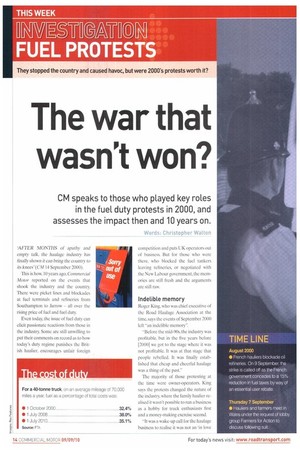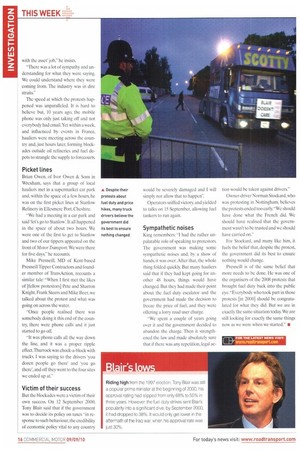The war that wasn't won?
Page 134

Page 136

If you've noticed an error in this article please click here to report it so we can fix it.
CM speaks to those who played key roles in the fuel duty protests in 2000, and assesses the impact then and 10 years on.
Words: Christopher Walton AFTER MONTHS of apathy and empty talk, the haulage industry has finally shown it can bring the country to its knees' (CM 14 September 2000).
This is how, 10 years ago, Commercial Motor reported on the events that shook the industry and the country. There were picket lines and blockades at fuel terminals and refineries from Southampton to Jarrow — all over the rising price of fuel and fuel duty.
Even today, the issue of fuel duty can elicit passionate reactions from those in the industry. Some are still unwilling to put their comments on record as to how today's duty regime punishes the British haulier, encourages unfair foreign competition and puts UK operators out of business. But for those who were there, who blocked the fuel tankers leaving refineries, or negotiated with the New Labour government, the memories are still fresh and the arguments are still raw.
Indelible memory
Roger King. who was chief executive of the Road Haulage Association at the time, says the events of September 2000 left "an indelible memory': "Before the mid-90s, the industry was profitable, but in the five years before [20001 we got to the stage where it was not profitable. It was at that stage that people rebelled. It was finally established that cheap and cheerful haulage was a thing of the past."
The majority of those protesting at the time were owner-operators King says the protests changed the nature of the industry, where the family haulier realised it wasn't possible to run a business as a hobby for truck enthusiasts first and a money-making exercise second.
"It was a wake-up call for the haulage business to realise it was not an 'in love with the asset' job," he insists.
"There was a lot of sympathy and understanding for what they were saying. We could understand where they were coming from. The industry was in dire straits."
The speed at which the protests happened was unparalleled. It is hard to believe but, 10 years ago, the mobile phone was only just taking off and not everybody had email.Yet within a week, and influenced by events in France, hauliers were meeting across the country and, just hours later, forming blockades outside oil refineries and fuel depots to strangle the supply to forecourts
Picket tines Brian Owen, of Ivor Owen Sc. Sons in Wrexham, says that a group of local hauliers met in a supermarket car park and, within the space of a few hours, he was on the first picket lines at Stan low Refinery in Ellesmere Port, Cheshire.
"We had a meeting in a car park and said 'let's go to Stanlowl It all happened in the space of about two hours. We were one of the first to get to Stan low and two of our tippers appeared on the front of Motor Transport. We were there for five days,he recounts.
Mike Presneill. MD of Kent-based Presneill Tipper Contractors and founder member of TransAction, recounts a similar tale: "When I first met the likes of [fellow protestors] Pete and Sharron Knight, Frank Steers and Mike Beer, we talked about the protest and what was going on across the water.
"Once people realised there was somebody doing it this end of the country, there were phone calls and it just started to go off.
"It was phone calls all the way down the line, and it was a proper ripple effect. Thurrock was chock-a-block with trucks. I was saying to the drivers 'you dozen people go there' and 'you go there', and off they went to the four sites we ended up at."
Victim of their success But the blockades were a victim of their own success. On 12 September 2000, Tony Blair said that if the government was to decide its policy on taxes "in response to such behaviour, the credibility of economic policy vital to any country
would be severely damaged and I will simply not allow that to happen".
Operators sniffed victory, and yielded to talks on 15 September, allowing fuel tankers to run again.
Sympathetic noises
King remembers: "I had the rather unpalatable role of speaking to protestors. The government was making some sympathetic noises and, by a show of hands, it was over. After that, the whole thing folded quickly. But many hauliers said that if they had kept going for another 48 hours, things would have changed. But they had made their point about the fuel duty escalator and the government had made the decision to freeze the price of fuel, and they were offering a lorry road user charge.
-We spent a couple of years going over it and the government decided to abandon the charge. Then it strengthened the law and made absolutely sure that if there was any repetition, legal ac
tion would be taken against drivers."
Owner-driver Norman Stockard, who was protesting in Nottingham, believes the protests ended too early. "We should have done what the French did. We should have realised that the government wasn't to be trusted and we should have carried on.
For Stoekard, and many like him, it fuels the belief that, despite the protest, the government did its best to ensure nothing would change.
Presneill is of the same belief that more needs to be done. He was one of the organisers of the 2008 protests that brought fuel duty back into the public eye. "Everybody who took part in those protests [in 2000] should be congratulated for what they did. But we are in exactly the same situation today. We are still looking for exactly the same things now as we were when we started." •
























































































































































































































































